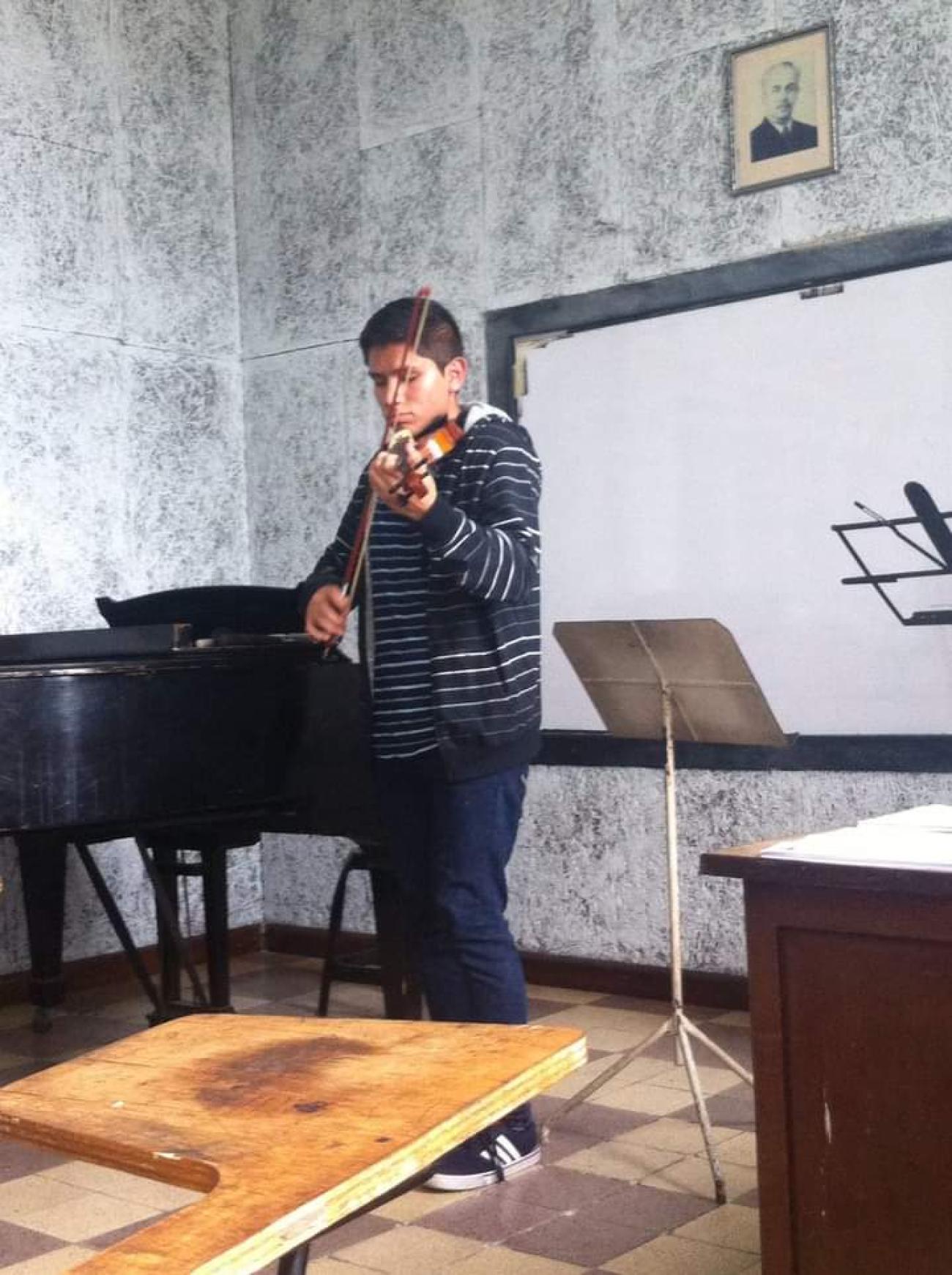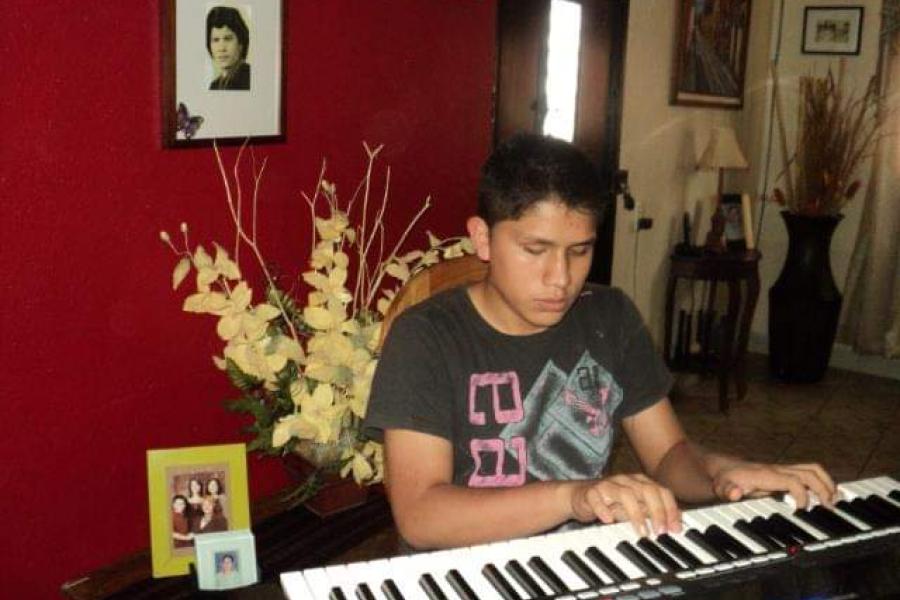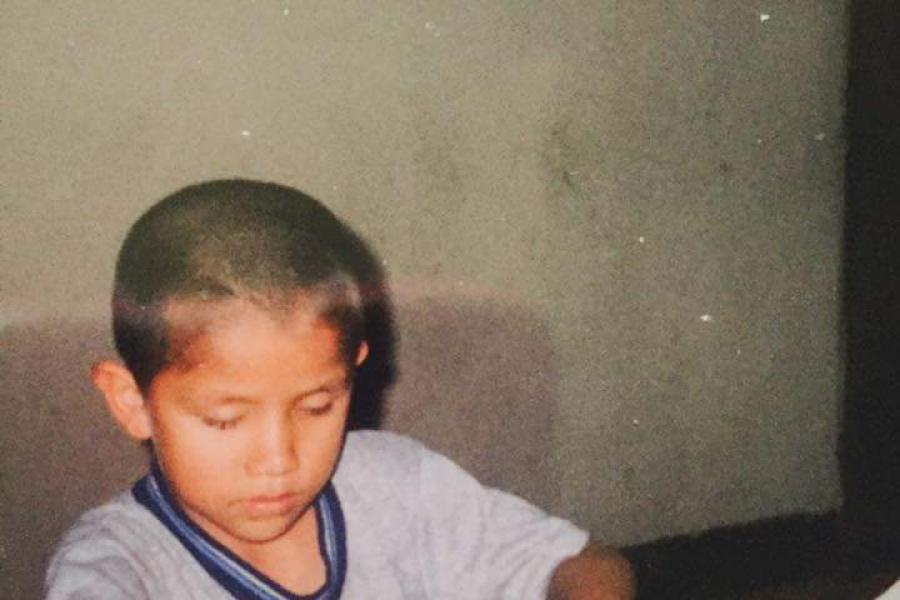El lugar donde más cómodo me he sentido

"He luchado por los derechos de las personas con discapacidad y de grupos vulnerables. Siento que lo estoy logrando.Eso me anima a llevar otra carrera"
Según cuenta mi madre; Miriam Palma, cuando tenía un año fui diagnosticado con retinoblastoma. A los cuatro años perdí totalmente la vista. A mi familia les impactó fuertemente mi situación. Se hicieron todas las consultas posibles y no había opción de cirugía. Con esa condición tenía que tratar toda la vida.
Hoy puedo decir que encontré la ruta hacia mi desarrollo pleno” comenta Antonio Palma, el Voluntario de las Naciones Unidas en la Oficina del Coordinador Residente.
“Entré a la escuela Santa Lucía a mis 5 años. Allí tenía programas ajustados a la discapacidad visual, por lo que logré avanzar en mi formación. Al pasar a una escuela regular comenzaron las barreras.” El trato de compañeras y compañeros de clase, de docentes y hasta familia de otros estudiantes venía cargada de incomprensión. “Lo tomo como un proceso de aprendizaje para mí y para los demás” expresa Antonio con serenidad.
Antonio estudió música en el colegio y aprendió a tocar el violín, piano y guitarra. Cuando entró a la escuela de música se sentía bastante adaptado y no hubo complicación para lograr la inclusión, los y las cátedras ya tenían experiencia en enseñanza a personas en condición de discapacidad visual.

La experiencia de discriminación que Antonio más recuerda fue en una ocasión cuando su madre lo fue a matricular a un colegio y le informaron que si había cupo para que él estudie dentro de la institución, pero, cuando la institución se percató de su discapacidad, le comunicaron a la madre que ya no había espacio para que el pudiera estudiar. “Mi mamá se puso muy triste, contrariada e impotente”, pero no perdió la fe y siguió luchando.
La discriminación es una realidad que afecta a las sociedades en general. Guatemala no es la excepción. Las personas a menudo acuden a expresiones lastimeras que son inapropiadas y que reducen a las personas con discapacidad a una limitación, sin ver sus enormes capacidades, sus potencialidades y sobre todo que son personas con derechos humanos, al igual que el resto de personas en Guatemala y el mundo.
Antonio es un joven polifacético. Al iniciar su carrera de Ciencias de la Comunicación en la Universidad de San Carlos Guatemala, tuvo que pasar por varios sucesos excluyentes. Comenzando por la infraestructura universitaria que tenía muchas barreras para movilizarse. Pasando por la actitud de las personas que no comprenden la condición de una persona con discapacidad. “Me sentí retado a superar las barreras.
"Hoy que me veo en esta oficina de la ONU, pienso que he hecho muchas cosas bien, la vida me ha permitido educar a mucha gente en los principios de los Objetivos de Desarrollo Sostenible y comienzo a comprender de forma profunda y a vivir su lema de no dejar a nadie atrás” expresa sonriente.
“He luchado por los derechos de las personas con discapacidad y de grupos vulnerables. Siento que lo estoy logrando. Eso me anima a llevar otra carrera universitaria como lo es ciencias jurídicas y sociales, abogado y notario. Ser abogado me permitirá estar en mejor posición para consolidar mis metas” dice Antonio mientras agradece que actualmente su universidad cuenta con guías dentro del espacio. Ya no escucha las voces que le decían “esta carrera no es la idónea para tu discapacidad”. Al respecto, luego de suspirar expresa “hoy sé que esas expresiones encierran ignorancia y son parte de una cultura de exclusión por la que hay que trabajar en la sensibilización y en la generación de conocimiento inclusivo”.
Tiene en mente generar procesos que modifiquen normativas como el Código de Notariado que dictamina que las personas con discapacidad visual no pueden ejercer. Cuenta que hay también profesionales del derecho que coinciden con él en la necesidad de modificar esas normativas discriminatorias, seguro serán sus aliados en el futuro. Esas voces las toma como una oportunidad para trabajar más fuerte por los derechos humanos.
Como ejemplos de oportunidades y desafíos Antonio nos cuenta que actualmente la tecnología se está volviendo una buena aliada para su trabajo. Utiliza en su computadora un programa denominado NVDA (Non-visual Desktop Access, acceso al escritorio para no videntes), así como las aplicaciones de teléfono celular. Puede usar todos los programas porque la mayoría traen la opción de accesibilidad. Sin embargo, nos cuenta que el Power Point es uno de los que da más dificultad, sobre todo por la condensación de información en fotografías sin descripción. Lo mismo pasa con los PDF cuando las personas los graba como imagen y no como texto. Cada vez las personas van siendo más conscientes y aprenden que cada programa trae una opción para personas con discapacidad visual o auditiva, explica Antonio.
Recuerda que en tres ocasiones envió papelería para ingresar al Programa de Voluntariados de las Naciones Unidas. “La tercera fue la vencida. En noviembre del 2021 llegué al edificio de las Naciones Unidas para un tour guiado que tenía como fin conocer el lugar y mejorar mi movilidad dentro de las oficinas. Había sido contratado. Estaba muy emocionado. Conocí a mi supervisor y me sorprendió cuando dijo que iban aprender de mí. Esa fue una pauta que me hizo ver a dónde había llegado”, cuenta mostrando gran satisfacción.
“He publicado dos columnas de opinión en el Diario Centro América, participé en la presentación de dos programas de televisión Hoy con la ONU, hago locución y producción en informativos diarios para Radio TGW, además de brindar asesoría en inclusión a la Oficina de la Coordinación Residente” comparte el entrevistado. El Coordinador Residente, Miguel Barreto, expresó en una reunión pública sobre inclusión de personas con discapacidad, el honor que representa para su oficina el contar con el profesionalismo y compromiso de Antonio.
Lo que Antonio más aprecia de su voluntariado es que los aportes de sus conocimientos son tomados en cuenta dentro del Sistema de las Naciones Unidas y profesionalmente lo que más aprecia es que está trabajando en la rama que más le gusta y se siente cómodo.
Antonio tiene planes a mediano y largo plazo en los que cabe mencionar, piensa cerrar su carrera universitaria en Ciencias de la Comunicación la cual le falta poco por culminar, quiere continuar aportando en la oficina de Naciones Unidas y a largo plazo, culminar su carrera de derecho y aportar en el logro de los ODS, de ser posible a diferentes organizaciones y a la sociedad.
Al finalizar expresa con gran determinación: “Es en la organización dónde más cómodo me he sentido”. La contratación de Antonio es parte de la política del Secretario General de inclusión de personas con discapacidad dentro del personal de la ONU.
Antonio aporta su experiencia y sus conocimientos a la Oficina de la Coordinación Residente como parte de los proyectos del Fondo de las Naciones Unidas para los Derechos de las Personas con Discapacidad (UNPRPD), financiado por el Fondo Multisocios de las Naciones Unidas (MPTF).

Escrito por Fiorella Arita, practicante universitaria, UNAH (Honduras), en la Oficina de la Coordinación Residente de ONU Guatemala.
Traducción a Inglés por Emilia Alvarado Alvarez Depresle, practicante universitaria en Université Savoie Mont Blanc, Francia.
-----
The place where I have felt most comfortable
“According to my mother; Miriam Palma, when I was one year old I was diagnosed with retinoblastoma. At the age of four I completely lost my sight. My family was shocked by my situation. All possible consultations were made and there was no option of surgery” said Antonio.
He had to deal with this condition all his life and still is.
“Today I can say that I found the path, my purpose to my full development”, says Antonio Palma, as a volunteer in the Office of the Resident Coordinator of the United Nations.
“I entered the Santa Lucía school when I was 5 years old. There I had programs adjusted to visual impairment, so I was able to advance in my training. When moving to a regular school the barriers began.” The treatment of my classmates, teachers and even the families of other students became a problem and a whole lot of misunderstandings. "I take it as a learning process for myself and for others" Antonio expresses serenely.
Antonio learned music at school and learned to play the violin, piano and guitar. When he was admitted to a music school he felt quite adapted and there were no complications. The professors already had experience in teaching people with visual disabilities.
The experience of discrimination that Antonio remembers the most was on one occasion when his mother went to enroll him in a school and they informed him that there was a place for him to study within the institution, but when the institution became aware of his disability, they told his mother that there was no longer a place for him to study. "My mom was very sad, upset and powerless," but she did not lose faith and kept fighting.
Discrimination is a reality that affects societies in general. Guatemala is no exception. People often resort to pitiful expressions that are inappropriate and that reduce people with disabilities to a limitation, without seeing their enormous capacities, their potential and above all that they are people with human rights, just like the rest of the people in Guatemala and the world.
Antonio is a versatile young man. When starting his career in Communication at the University of San Carlos Guatemala, he had to go through several exclusionary events. Starting with the university infrastructure that had many barriers to get around. Going through the attitude of people who do not understand the condition of a person with disabilities. “I felt challenged to overcome the barriers”.
Today that I see myself in this UN office, I think that I have done many things well, life has allowed me to educate many people on the principles of the Sustainable Development Goals and I am beginning to deeply understand and live by the motto: “Do not leave anyone behind” he expressed with great joy.
“I have fought for the rights of people with disabilities and vulnerable groups. I feel like I'm getting there. That encourages me to take another university career such as Legal and Social Sciences, to become a lawyer. Being a lawyer will allow me to be in a better position to consolidate my goals” says Antonio while he is grateful that his university is open to this idea. He no longer hears the voices that told him “this career is not the right one for your disability”. In this regard, after sighing, he expresses "today I know that these expressions contain ignorance and are part of a culture of exclusion for which we must work on raising awareness and generating inclusive knowledge."
He has in mind to change legal processes and modify regulations such as the Notarial Code that dictates that people with visual disabilities cannot practice it. He says that there are also legal professionals who agree with him on the need to modify these discriminatory regulations, they will surely be his allies in the future. He takes these voices as an opportunity to work harder for human rights.
As examples of opportunities and challenges, Antonio tells us that technology is currently becoming a good ally for his work. He uses a program called NVDA (Non-visual Desktop Access) on his computer, as well as mobile phone applications. He can use all the programs because most of them come with the accessibility option. However, he tells us that Power Point is one of the most difficult, especially because of the lack of photographs without descriptions. The same thing happens with PDFs when people save them as an image and not as text. “Everyday people are becoming more aware and learning that all programs have an option for people with visual or hearing disabilities”, explains Antonio.
He remembers that on three occasions he sent his paperwork to the United Nations Volunteer Program. "The third time was the charm. In November 2021, I arrived at the United Nations building for a guided tour that aimed to get to know the place and improve my mobility within the offices”. He had been hired. “I was very excited” he said. I met my supervisor and was surprised when he said that they were going all going to learn from me as well. “That was the moment I realized I had made it”, he says showing great satisfaction.
“I have published two articles in the Diario Centro América newspaper, I participated in the presentation of two television programs Hoy con la ONU, I do voiceover and production in daily news for Radio TGW. “In addition, I provide advice about inclusion to the Coordination Office Resident”, shares the interviewee. The Resident Coordinator, Miguel Barreto, expressed in a public meeting on the inclusion of people with disabilities, the honor that it represents for his office to have Antonio's professionalism and commitment.
What Antonio appreciates most about his volunteering is that the contributions of his knowledge are taken into account within the United Nations and professionally what he appreciates the most is that he is working in the branch that he likes the most and feels comfortable with.
Antonio has medium and long-term plans in which it is worth mentioning, he plans to close his university degree in Communication which he is close on concluding, he wants to continue contributing to the United Nations office and in the long term, complete his law degree and contribute to the achievement of the SDGs, if possible to different organizations and to society.
At the end, he expresses with great determination: "It is in the organization where I have felt most comfortable." Antonio's hiring is part of the Secretary General's policy of inclusion of persons with disabilities within the UN staff.
Antonio brings his experience and knowledge to the Resident Coordination Office as part of the projects of the United Nations Fund for the Rights of Persons with Disabilities (UNPRPD), funded by the United Nations Multi-Partner Fund (MPTF).

